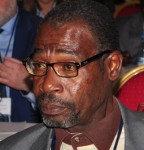Held in Dakar, Senegal, this year’s IZA Annual Migration Meeting acquired a tragic topicality: The ongoing loss of lives in the Mediterranean Sea makes migration from Africa to Europe one of the most pressing policy challenges at the moment. Tomorrow German policymakers will come together at a refugee summit in Berlin. However, much of the European debate centers on how to deal with (and pay for) the inflow of refugees.
 To provide an inside view from one of the major source countries of African emigration, we talked to Mamadou Dansokho (University Cheikh Anta Diop of Dakar and CRES), who is an expert on migration and economic development in West Africa:
To provide an inside view from one of the major source countries of African emigration, we talked to Mamadou Dansokho (University Cheikh Anta Diop of Dakar and CRES), who is an expert on migration and economic development in West Africa:
How would you describe emigration from Senegal in terms of the costs and benefits for your country?
Dansokho: Senegal has a long history of emigration to Europe. The first wave of emigrants left the country after the Second World War, while the most important wave occurred in the 1970s, when many people from the North and South East of Senegal moved to Europe. These emigrants have been instrumental for their hometowns until today. Through remittances, they not only support families, but they help building and maintaining hospitals, and thus invest in the education and health of the people left behind.
But emigration also comes at a cost. Many emigrants have relatively low education levels. At the same time, they serve as role models for young people. Instead of aspiring to go to university, many young people think that education is not important because they can do better by moving abroad. Thus, many young people no longer believe in the benefits of higher education, and even of work. This is an enormous economic cost.
But there is also a social cost for the Senegalese abroad and the societies they live in. Children of the second immigrant generation find it increasingly difficult to integrate in the society. Take the example of France. Many young Africans only know poor areas in the Banlieue. There is a great emptiness in the young generation, a lack of identity, which makes them vulnerable to fundamentalism.
What can West African and European policymakers do to stop the refugee tragedy in the Mediterranean Sea?
Dansokho: It’s a drama. Africa and Europe certainly look back on a difficult common history. But one has to realize the cynicism of today’s world. European societies are very rich, and they know well the situation in most African countries. Without economic development, the only hope for young Africans is to move abroad. And while we live in a globalized world, it only goes so far. We have been asked to sign agreements which ensure free movement of goods and services, but which exclude the free movement of people.
At the same time, young people who want to pursue their higher education in Europe, especially in France, face difficulties. They are often brilliant minds, but the bureaucratic hurdles to enroll in a French university are enormous. Many young people are now more oriented toward the United States, and even China, because university access there is easier, and the universities are more integrative.
Also, even though civil rights are important in Europe, Europe has no harmonized rights for immigrants. African immigrants often feel marginalized, which can breed fundamentalism. Europe needs to improve the rights for immigrants. At the same time, if the goal is to control emigration from Africa, more funds will need to be provided for economic development in Africa.